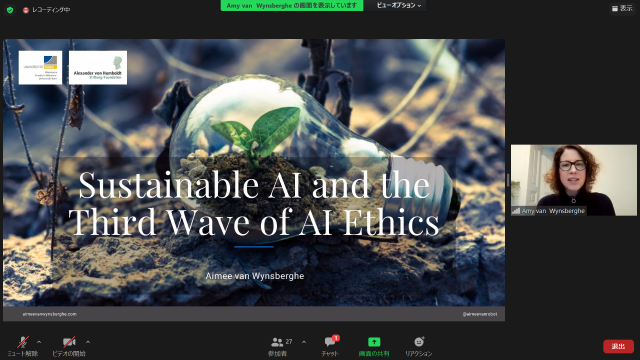The lecture by Professor Aimee van Wynsberghe, “Sustainable AI and the Third Wave of AI Ethics,” provided an overview of existing issues related to ethics and artificial intelligence and new issues to be considered. It informatively introduced currents in AI ethics and provided deep insights into issues that we should all consider, based on Professor van Wynsberghe own experience.
Professor van Wynsberghe sees ethics as “resources.” She originally studied cell biology but was faced with the problem of introducing robots into the medical field. This would significantly affect patients, nurses, and doctors, which prompted her to study ethics. Her motivation was to “translate” ethical and philosophical concepts for practical use, rather than discuss them in the abstract. “Ethics should be useful” is her motto.
After showing her understanding of ethics in general as the study for a good life, Professor van Wynsberghe introduced the waves of AI ethics. The first wave was concerned with “AI as super-intelligent.” People saw AI as a monstrous invention and feared for the future of humankind. The second wave was more subtle, focused on AI’s detailed design and application. It encompassed the ethics of collecting and labeling data, privacy, transparency, and trustworthiness in AI. The discussion in this wave regarded ethics not as an afterthought, but as part of design.
As the title of her lecture indicated, the third wave was Professor van Wynsberghe’s main focus. This wave has examined “sustainable AI” in two senses: AI for sustainability and sustainability of AI. Since AI has become a social infrastructure, we should use it to preserve social sustainability and pay attention to sustainably using it. For example, scholars and policymakers used AI for forecasting and preventing forest destruction at the recent United Nations Climate Change Conference. It is, of course, effective. However, running AI to make such big predictions consumes a massive amount of energy and emits lots of CO2. As such, it is not self-evident that we can develop and run AI to its fullest extent: we must consider the cost of using AI. This problem also encompasses labor exploitation in mining minerals for AI, land and sea pollution, and waste from machines. More and more of enterprise is involved with developing and using AI, and there is not enough concern about its cost. The vocabulary surrounding AI is often ethereal and fantastic, but we must also pay attention to its physical conditions.
The discussion with the students covered a wide range of issues such as national security, democracy, and “translating” concepts. Professor van Wynsberghe answered these carefully and in an encouraging way.
The lecture recognized the many issues we have to tackle, but Professor van Wynsberghe seemed confident that this was possible if we work together. Such an attitude may well be related to her view of ethics. Ethics is never a checklist but concerns the process of our lives and society. We live together, and we can pursue a better life. This fundamental hope may be the keystone of ethics.

Report by MIYATA Akihiro (EAA Research Assistant)








